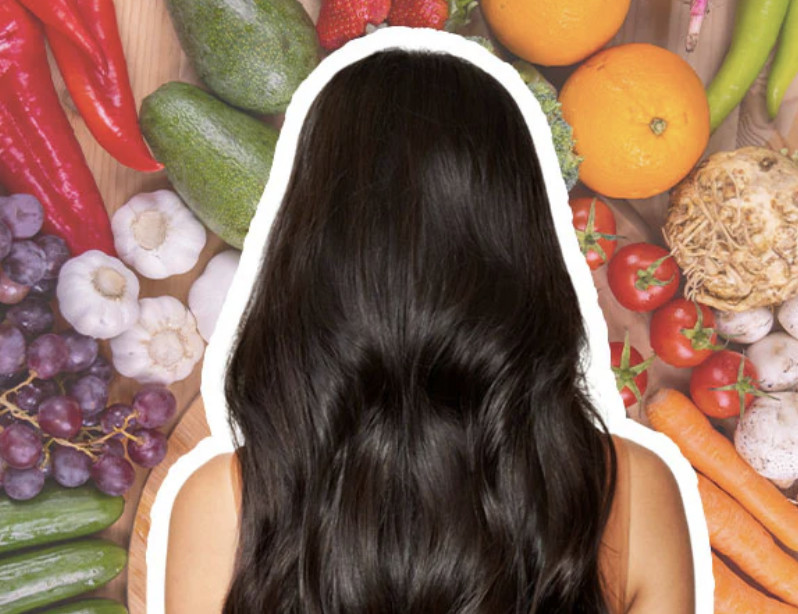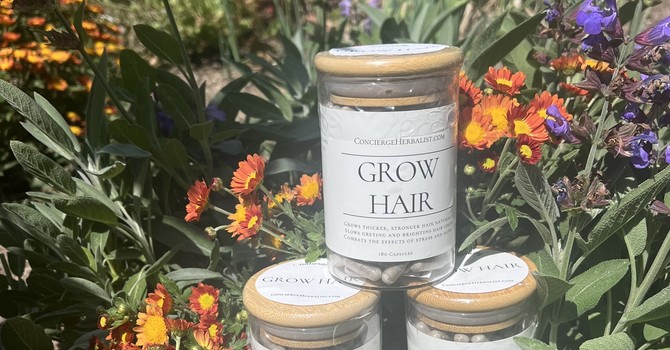
By Dr. Kim Drolet, DACM, L.Ac. — Concierge Herbalist
Natural Chinese Medicine for Hair, Skin & Vitality
Introduction
Yes, food and nourishment can help foster hair growth and health (and this is also the root of skin and overall "vitality" as well!). Below you'll find food ingredients and how they help. But, before diving into those specific foods that support hair health, it’s helpful to understand a few key Chinese medicine terms that describe how your body maintains vitality and balance. These ideas don’t replace Western physiology. They complement it, offering a broader language for what we experience in health and aging.
Qi (pronounced “chee”). Often translated as “vital energy.” Qi is the life force that drives every process in the body: circulation, digestion, growth, and repair. Healthy Qi means your body efficiently transforms food into nourishment and sends it to your hair roots. Qi is also the basis of all Blood (described next), and it is said that "Qi is the mother of blood".
Blood (Xue). In Chinese medicine, Blood overlaps with the Western idea of physical blood, but it is a much broader concept. What you need to know for hair is that it carries nourishment, warmth, is also related to ability to weather, adapt/adjust when there is emotional instability and "stress" (or Liver Qi stagnation, described briefly below). When Blood is full and flowing, hair is glossy and resilient. When deficient, hair may become dry, thin, or shed easily.
Yin. Yin represents moisture, coolness, and the body’s restorative energy. I like to call it the "goo" of the body. It’s what keeps your scalp hydrated and prevents internal “heat” from drying out your hair or causing inflammation.
Jing (Essence). Jing is akin your inherited vitality, akin to genetic potential or DNA. Jing "governs" growth, reproduction, and aging. It’s your deepest reserve. When Jing is abundant, hair stays thick and strong. Over time or with stress, Jing can become depleted, leading to premature graying or thinning. Jing also can account for why some families can grow hair to their ankles and others more naturally stop and low or mid back in "potential." We are born with Jing potential, and we can keep it strong in life so we can have the best hair to our Jing Potential.
Liver Qi. In Chinese medicine, the Liver governs the smooth flow of energy and emotions. “Liver Qi stagnation” doesn’t mean a liver disease, it describes emotional or physical tension that restricts circulation. When Liver Qi is balanced, nutrients reach the scalp easily, and stress-related hair loss improves.
Together, Qi, Blood, Yin, Jing, and the smooth flow of Liver Qi form the foundation of healthy hair in Chinese medicine. The following pages show how specific foods and herbs nourish each of these energies for stronger, fuller, and more vibrant hair. Healthy hair is more than what you put on your scalp—it’s a reflection of your internal vitality. In Chinese medicine, hair growth and strength are influenced by Blood, Yin, Jing (Essence), Qi, and the smooth flow of Liver Qi. When these energies are abundant and balanced, hair grows strong, glossy, and resilient. When they’re depleted or stagnant, hair may thin, dry, or fall out.
This guide brings together everyday foods, herbs, and teas that nourish these core foundations, bridging the ancient wisdom of Chinese food therapy with modern, accessible ingredients. The point is you don't have to eat them all. My approach for you is to find some you already like or know, and start using them. more in your daily diet. And, if adventurous, start looking at new and unknown ingredients. You can use this list to help you choose meals and ingredients when you are at home or in a restaurant.
Build & Circulate Blood
Hair Root Nourishment & Color Vitality
Blood is the foundation of hair growth. In TCM, the Liver stores Blood and sends it upward to nourish the scalp and follicles. Weak or stagnant Blood can lead to dry, brittle, or thinning hair. Building Blood through diet supports natural shine and color.
Key Foods
Beets, beet greens, spinach, kale, chard, collards, parsley, blackberries, blueberries, cherries, grapes, pomegranate, prunes, plums, figs, longan, lychee, red dates, black beans, all organ meat, shiitake mushrooms, egg yolk, red meat and lamb, all organ meat.
Herbal Allies
Dang Gui (Angelica), Goji berries (Gou Qi Zi), Black/Red dried plum (Da Zao/Hong Zao.)
Tips: Combine leafy greens and beetroot with citrus to aid absorption. Add Goji and red dates to soups or teas for gentle daily tonification.
Tonify Kidney Jing (Essence)
Longevity, Regeneration & Pigmentation
Jing is your deep reserve, the "essence/potential" you’re born with. It governs growth, fertility, and aging. When Jing declines, signs include premature graying, weak roots, and slow hair regrowth. While we cannot stop aging, we can however, relatively build Jing during life. Foods that build Jing replenish your body’s deepest stores, create resiliency, and help foster hair growth. They are also great for skin.
Core Jing Tonics
He Shou Wu (Fo-Ti), black sesame seeds, walnuts, bone broth, seaweed (kelp, wakame, nori), oysters, all organ meat, black foods in general.
Supportive Fruits & Veggies
Mulberries (Sang Shen), asparagus, black rice, Chinese yam (Shan Yao), amla (Indian gooseberry).
Tips: Enjoy black sesame and walnuts as toppings, or simmer bone broth with seaweed for a mineral-rich base. Look for black foods and if you see them, choose them (for example, at a restaurant if you see black squid ink pasta, try that!)
Tonify Yin (Moisture & Nourishment)
Hydration & Scalp Health
Yin provides the fluids and moisture that keep hair soft and the scalp healthy. Deficient Yin often shows as dryness, itchiness, or heat-related thinning. Cooling, hydrating foods nourish Yin and restore balance.
Key Foods
Avocado, pear, apple, cucumber, zucchini, tomato, watermelon, persimmon, lotus root, aloe gel, coconut water, tofu/soy milk, all organ meat
Herbs & Oils
Sheng Di Huang (Rehmannia), sesame oil.
Tips: Steam or lightly cook vegetables to preserve moisture. Blend pear and avocado for a Yin-nourishing smoothie.
Soothe Liver Qi & Support Stress Resilience
Ease Tension & Promote Flow
The Liver governs the smooth flow of Qi and emotions. Stress, frustration, or overwork can stagnate Liver Qi, leading to hair loss from tension or hormonal imbalance. Foods that soothe the Liver help Qi move freely, ensuring Blood nourishes the scalp.
Balancing Foods
Citrus (lemon, lime, orange, pomelo), bitter greens (arugula, dandelion, radicchio), cruciferous veggies (broccoli, cabbage), artichoke, celery, asparagus, berries.
Calming Herbs & Adaptogens
Rose buds (Mei Gui Hua), chrysanthemum (Ju Hua), mint (Bo He), lemon balm, holy basil (Tulsi), schisandra berries (Wu Wei Zi), reishi (Ling Zhi), chamomile.
Tips: Sip rose and chrysanthemum tea during stressful weeks. Include bitter greens daily to keep Liver Qi flowing.
Strengthen Qi & Spleen
Digestive Strength & Nutrient Delivery
The Spleen transforms food into Qi and Blood. If weak, you may feel bloated, fatigued, and hair may lack vitality. Strengthening Spleen Qi ensures nutrients reach the scalp efficiently.
Energizing Foods
Sweet potato, yam, pumpkin, kabocha, winter squash, carrots, butternut squash, millet, oats, brown rice, quinoa, banana, dates, ginger, leeks, green onion, fennel, tofu.
Tips: Eat cooked, warm foods. Avoid excessive cold/raw meals that burden digestion.
Daily Tonics & Teas
-
Goji + Chrysanthemum + Rose: Blood & Yin + Liver Qi balance
-
Mint + Lemon peel: Clears mild Heat & moves Qi
-
Mulberry + Jujube: Blood & Yin nourishment
-
He Shou Wu + Black sesame + Mulberry: Deep Jing & Blood replenisher
-
Reishi + Schisandra: Adaptogenic stress support
Culinary Therapy Pairings
-
Beet–orange–arugula salad: Blood & Liver Qi harmony
-
Pumpkin–ginger soup: Strengthen Spleen Qi & circulation
-
Black bean–avocado bowl: Jing + Yin + Qi trio
-
Asparagus–lemon zest stir-fry: Yin + Liver Qi movement
-
Bone broth with Dang Gui & Goji: Blood + Jing powerhouse
Balancing the Whole System
-
Cold/Damp constitution: Favor warm, cooked foods; avoid excess raw or juicy fruits.
-
Heat/Yin deficiency: Emphasize Yin-nourishing, cooling foods.
-
Stress-related hair loss: Combine Liver Qi soothers with Blood and Jing nourishers.
I'll leave you with this thought...
Hair is a living reflection of internal balance. By understanding your body’s needs through a Chinese medicine lens, you can eat to truly nourish from the inside out. Rotate these foods seasonally, listen to your body, and enjoy the process of restoring your natural shine.

Kim Drolet
Contact Me



